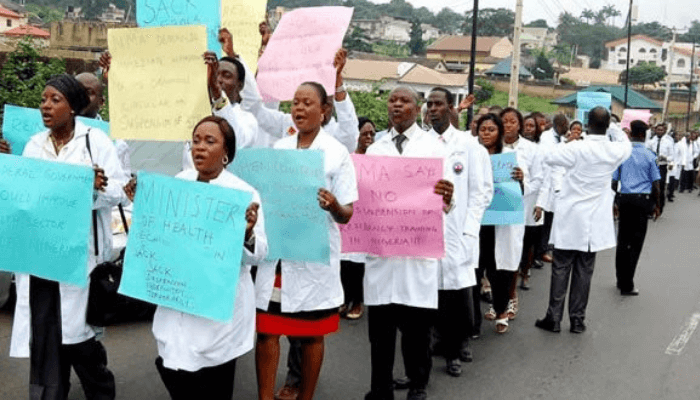91 hospitals, 11,000 doctors, 19 demands – Inside NARD’s indefinite strike
Healthcare services across Nigeria are facing a major disruption as about 11,000 resident doctors under the umbrella of the Nigerian Association of Resident Doctors (NARD) have embarked on an indefinite nationwide strike.
The industrial action, which commenced at 12:00 am on Saturday, is affecting operations in 91 healthcare facilities, including teaching hospitals, Federal Medical Centres, specialist institutions, and some private facilities.
The strike was confirmed by Dr. Muhammad Suleiman, NARD’s president, in a telephone interview with BusinessDay, stating that the decision followed the expiration of a 30-day ultimatum and an emergency National Executive Council (NEC) meeting held earlier in the week.
Read also: NARD strike: UPTH reassures patients, puts contingency plan in action
“Our members have decided to proceed with the strike. Although the Ministry of Finance is making efforts to address some financial issues, that alone does not cover the entirety of our demands. We have resolved to go ahead with a total, comprehensive, and indefinite strike,” Suleiman stated.
The association is pressing home a list of 19 unmet demands, ranging from salary arrears and unpaid allowances to unsafe working conditions and staff shortages.
At the heart of their grievances is the non-payment of 25 to 35 percent of CONMESS salary arrears, delayed specialist allowances, and the continued sack of five resident doctors from the Federal Teaching Hospital, Lokoja.
Other demands include the urgent recruitment of additional doctors through full enforcement of the government’s one-for-one replacement policy to address the worsening shortage of medical personnel, and the upgrade of medical facilities and equipment across public hospitals.
“The government is engaging us on the financial aspects, but those are only one out of 19 demands that remain largely unaddressed. This strike is not an executive decision; it is the collective mandate of our members nationwide,” Suleiman revealed.
The association is also demanding the correction of entry-level placements for house officers, the full inclusion of junior doctors in the public service salary structure, and the establishment of internationally aligned working-hour policies to safeguard both doctors and patients.
Read also: FG releases N4.5bn to 31 teaching hospital, Says NARD strike will end soon
The strike could have dire consequences for the country’s already strained healthcare system. Nigeria’s public hospitals have been struggling under the weight of limited manpower, poor infrastructure, and an exodus of medical professionals to other countries in search of better conditions.
Patients across major cities, including Abuja, Lagos, Kano, and Port Harcourt, are expected to bear the brunt of the shutdown, as resident doctors constitute a significant proportion of Nigeria’s hospital workforce. Their absence is likely to delay surgeries, suspend outpatient consultations, and restrict emergency care in several tertiary institutions.
Despite those engagements, NARD insists there will be no retreat until concrete steps are taken to resolve their long-standing grievances. “We are not asking for luxury. We are asking for fair pay, safer conditions, and functional hospitals for the Nigerian people,” Suleiman added.
As negotiations continue, the strike underscores the persistent tension between health workers and the government, a crisis that, for years, has threatened the stability of Nigeria’s healthcare delivery system.

